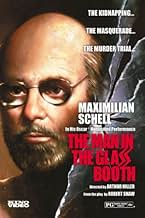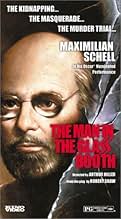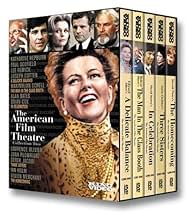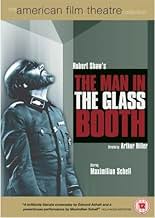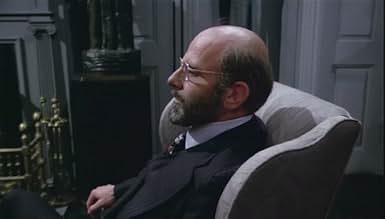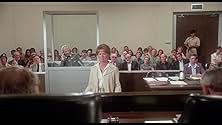AVALIAÇÃO DA IMDb
7,0/10
1,5 mil
SUA AVALIAÇÃO
Adicionar um enredo no seu idiomaMossad agents kidnap an American Jewish man, accuse him of being a fugitive Nazi war criminal and take him to Jerusalem to face trial for genocide.Mossad agents kidnap an American Jewish man, accuse him of being a fugitive Nazi war criminal and take him to Jerusalem to face trial for genocide.Mossad agents kidnap an American Jewish man, accuse him of being a fugitive Nazi war criminal and take him to Jerusalem to face trial for genocide.
- Indicado a 1 Oscar
- 3 indicações no total
Leonidas Ossetynski
- Samuel Weisberg
- (as Leonidas Ossettynski)
- Direção
- Roteiristas
- Elenco e equipe completos
- Produção, bilheteria e muito mais no IMDbPro
Enredo
Você sabia?
- CuriosidadesThis film was part of the American Film Theatre series, an experiment in marketing films (all based on plays) that would not otherwise have been able to get financing. Instead of being released to the general public, only people who purchased a subscription to the American Film Theatre series could buy tickets to any of its films. (Exceptions were made for movie critics and members of award-granting organizations, such as the American Academy of Motion Picture Arts and Sciences which awards the Oscars.) As a result, only a small number of people ever saw any of the films in their theatre runs. To enhance the value of the subscriptions, subscribers were guaranteed that the films would never be shown on television and never released to the general public. Legal issues connected with these guarantees kept this film from being available in any form for nearly 3 decades. It was finally released on DVD in 2003. The American Film Theatre experiment was abandoned after 2 years.
- Erros de gravaçãoThe Nazi Concentration Camps were run by the SS. The Wehrmacht (the regular German Army, also referred to as the Heer) was not directly involved in running the camps. Also The SS used it's own rank titles, so Dorf would have been known as a Standartenfuhrer instead of an Oberst (Colonel).
- Citações
Arthur Goldman: Passion play is a passion play.
- ConexõesFeatured in Sunset Over Mulholland Drive (2019)
- Trilhas sonorasEs war ein Edelweiss
(uncredited)
Written by Herms Niel
Sung by Lawrence Pressman and Maximilian Schell
Avaliação em destaque
The late Austrian actor Maximilian Schell first came to prominence in Hollywood in a supporting role as Nazi Marlon Brando's superior officer in the WWII epic THE YOUNG LIONS (1958); eventually, he became an international film star upon winning the Best Actor Oscar for Stanley Kramer's star-studded indictment of Nazi war crimes, JUDGMENT AT NUREMBERG (1961) which, despite the sheer brilliance of his performance, was a somewhat surprising accolade given that he was competing against Paul Newman's iconic characterization of Fast Eddie Felson in THE HUSTLER! Interestingly enough, two of Schell's future Oscar nominations also dealt with Nazism, namely THE PEDESTRIAN (1973; which Schell also directed) and the film under review which garnered him his second Best Actor nod. Once again, he came against an iconic performance – Jack Nicholson's Randle P. McMurphy in ONE FLEW OVER THE CUCKOO'S NEST – but lost out to it this time around; for the record, I have just came across the obscure GIVE'EM HELL HARRY which was the only Best Actor (James Whitmore) nominee from that same year which was still eluding me...
THE MAN IN THE GLASS BOOTH is the fourth of 14 productions from The American Film Theater that I have watched – following Lindsay Anderson's IN CELEBRATION (1975), Guy Green's LUTHER (1974) and Joseph Losey's GALILEO (1975) which more than anything sought to record and preserve renowned pieces of theatre that often featured notable actors. In this case, Arthur Hiller transposes Robert Shaw's play about a Jewish industrialist afflicted by the delusion of being a notorious Nazi officer; this controversial ruse undeniably elicits comparisons with THE RULING CLASS (1971) where Peter O'Toole's mad aristocrat first thinks he is Jesus Christ but then morphs into Jack The Ripper by the end of the film! Curiously enough, Shaw initially objected to Edward Anhalt's s adaptation of his material and asked to have his name removed from the film's opening credits; after watching it, however, he relented and agreed to put it back on but by then it was too late and, indeed, his name does not appear anywhere in the film's opening credits, In any case, there seems to have been no animosity between the two multi-talented actors as Schell eventually directed Shaw in END OF THE GAME (1975) and they co-starred in Shaw's untimely swan song AVALANCHE EXPRESS (1979).
Given the film's title, source of origin and subject matter, I was under the impression that the film would be entirely taken up by the trial which, when it actually comes on in the second half Is indeed riveting – with concentration camp survivors brought face to face with their tormentor; members of the aggrieved public rising from their seats to beat him up following his latest animated diatribe; Schell's own doctors 'confirming' his identity until one of them (Leonard Cimino) breaks down and admits that the evidence was planted by Schell himself! In this part of the film, the presence of passionate prosecutor Lois Nettleton and sensible Magistrate Luther Adler also makes itself felt. While the film's central conceit – a wealthy Jew exposed publicly as a notorious Nazi but ultimately emerging as a delusional Jew - is a fascinating one, it is quite contrived; in fact, the surprisingly fanciful first half, set atop paranoid Schell's NYC apartment, is somewhat heavy-going and even hard-to-take at times. That the film ends up being a worthy one regardless is mostly due to bald-headed, bearded and bespectacled Schell's tour-de-force performance; interestingly, despite the actor's Germanic heritage, he would again impersonate Jews in THE DIARY OF ANNE FRANK (1980; TV) and THE CHOSEN (1981). For the record, the copy I acquired suffers from lip-sync issues that can prove distracting at first but one grows accustomed to that fault before long.
THE MAN IN THE GLASS BOOTH is the fourth of 14 productions from The American Film Theater that I have watched – following Lindsay Anderson's IN CELEBRATION (1975), Guy Green's LUTHER (1974) and Joseph Losey's GALILEO (1975) which more than anything sought to record and preserve renowned pieces of theatre that often featured notable actors. In this case, Arthur Hiller transposes Robert Shaw's play about a Jewish industrialist afflicted by the delusion of being a notorious Nazi officer; this controversial ruse undeniably elicits comparisons with THE RULING CLASS (1971) where Peter O'Toole's mad aristocrat first thinks he is Jesus Christ but then morphs into Jack The Ripper by the end of the film! Curiously enough, Shaw initially objected to Edward Anhalt's s adaptation of his material and asked to have his name removed from the film's opening credits; after watching it, however, he relented and agreed to put it back on but by then it was too late and, indeed, his name does not appear anywhere in the film's opening credits, In any case, there seems to have been no animosity between the two multi-talented actors as Schell eventually directed Shaw in END OF THE GAME (1975) and they co-starred in Shaw's untimely swan song AVALANCHE EXPRESS (1979).
Given the film's title, source of origin and subject matter, I was under the impression that the film would be entirely taken up by the trial which, when it actually comes on in the second half Is indeed riveting – with concentration camp survivors brought face to face with their tormentor; members of the aggrieved public rising from their seats to beat him up following his latest animated diatribe; Schell's own doctors 'confirming' his identity until one of them (Leonard Cimino) breaks down and admits that the evidence was planted by Schell himself! In this part of the film, the presence of passionate prosecutor Lois Nettleton and sensible Magistrate Luther Adler also makes itself felt. While the film's central conceit – a wealthy Jew exposed publicly as a notorious Nazi but ultimately emerging as a delusional Jew - is a fascinating one, it is quite contrived; in fact, the surprisingly fanciful first half, set atop paranoid Schell's NYC apartment, is somewhat heavy-going and even hard-to-take at times. That the film ends up being a worthy one regardless is mostly due to bald-headed, bearded and bespectacled Schell's tour-de-force performance; interestingly, despite the actor's Germanic heritage, he would again impersonate Jews in THE DIARY OF ANNE FRANK (1980; TV) and THE CHOSEN (1981). For the record, the copy I acquired suffers from lip-sync issues that can prove distracting at first but one grows accustomed to that fault before long.
- Bunuel1976
- 3 de fev. de 2014
- Link permanente
Principais escolhas
Faça login para avaliar e ver a lista de recomendações personalizadas
- How long is The Man in the Glass Booth?Fornecido pela Alexa
Detalhes
- Data de lançamento
- País de origem
- Idiomas
- Também conhecido como
- The Man in the Glass Booth
- Locações de filme
- Empresas de produção
- Consulte mais créditos da empresa na IMDbPro
- Tempo de duração1 hora 57 minutos
- Mixagem de som
- Proporção
- 1.85 : 1
Contribua para esta página
Sugerir uma alteração ou adicionar conteúdo ausente

Principal brecha
By what name was Um Homem na Caixa de Vidro (1975) officially released in India in English?
Responda
